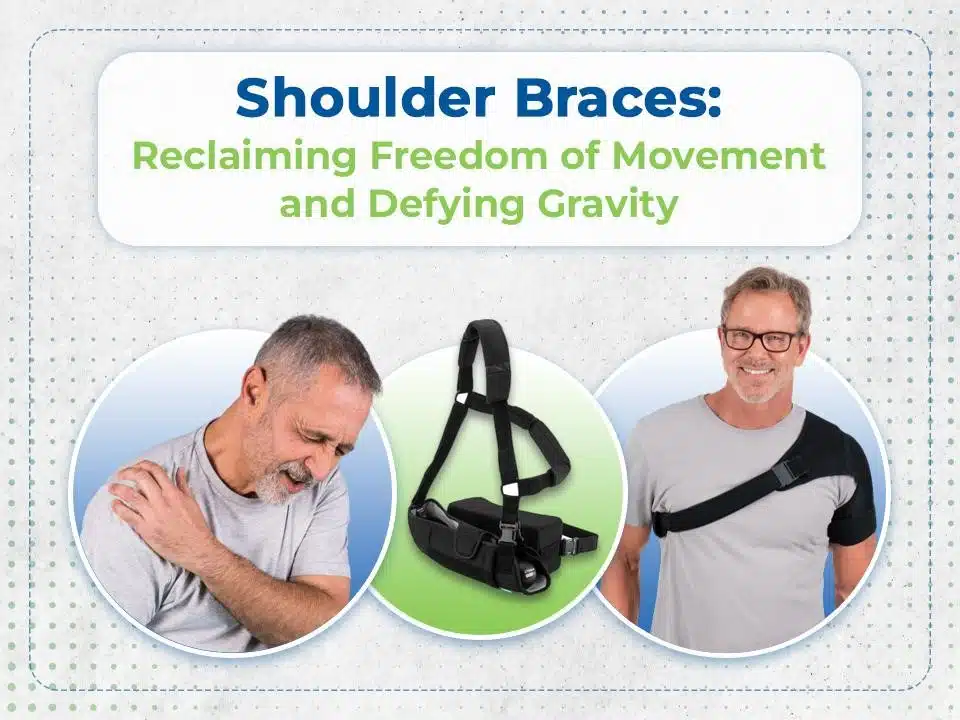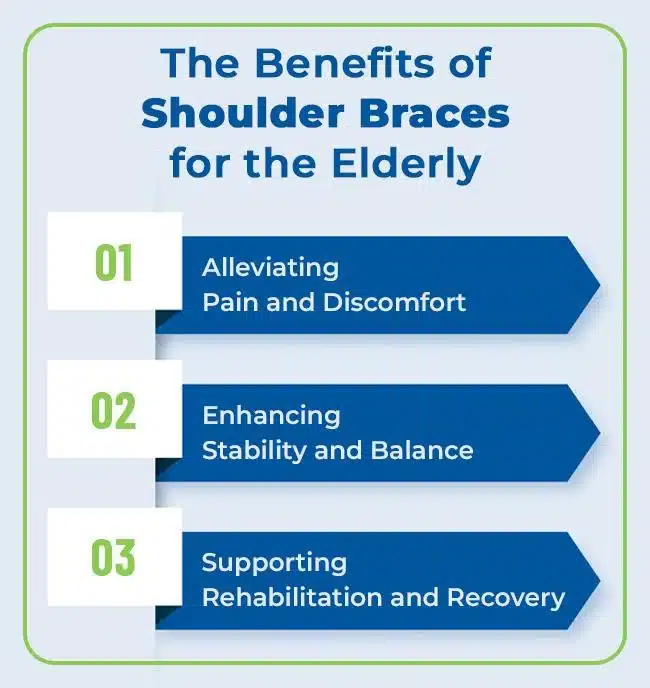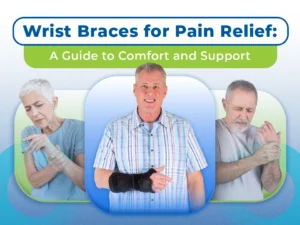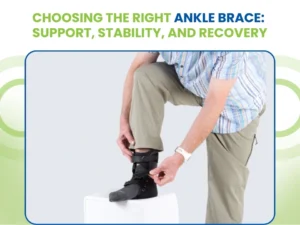As we age, our bodies may experience a decline in strength, flexibility, and overall mobility. Simple tasks such as reaching for an object or raising one’s arm can become challenging for elderly individuals. However, with the advent of modern medical technology, shoulder braces have emerged as an innovative solution, empowering seniors to reclaim their freedom of movement and defy the limitations of gravity. In this article, we will explore the significance of shoulder braces for the elderly and how these devices can enhance independence and overall quality of life.
Understanding the Importance of Shoulder Braces
Shoulder injuries usually tend to be the type of injury that requires your shoulder and arm to be fully immobilized. Shoulder pain is common in older adults; therefore, wearing a shoulder brace can be incredibly beneficial. Common conditions include frozen shoulder, rotator cuff tears, and rotator cuff tendinopathy.
Orthopedic shoulder braces can be used in the early stages of injury for support and protection to help the healing process and also to assist the rehabilitation process. A shoulder orthosis will limit the shoulder’s range of motion and strengthen the shoulder muscles, so finding the right product is essential.
Shoulder braces are specifically designed to provide stability and compression to the shoulder joint. These braces are commonly recommended for elderly individuals experiencing shoulder pain, limited range of motion, or recovering from injuries such as fractures or rotator cuff tears. The primary purpose of shoulder braces is to immobilize and protect the shoulder, allowing for proper healing and rehabilitation.
The Benefits of Shoulder Braces for the Elderly
1. Alleviating Pain and Discomfort
Elderly individuals often experience chronic shoulder pain due to arthritis, muscle weakness, or previous injuries. Shoulder braces provide gentle compression and support to the shoulder joint, reducing pain and discomfort. By stabilizing the shoulder, the brace helps relieve pressure on the affected area and promotes a more comfortable range of motion.
2. Enhancing Stability and Balance
Shoulder braces improve stability and balance, minimizing the risk of falls or accidents. With age, the muscles and ligaments supporting the shoulder joint may weaken, leading to instability. The brace provides external support, helping seniors maintain proper alignment and reducing the likelihood of sudden shoulder movements that may result in injury.
3. Supporting Rehabilitation and Recovery
For elderly individuals recovering from shoulder injuries or undergoing rehabilitation after surgery, shoulder braces play a crucial role in the healing process. These braces support the affected area, reducing strain on the injured tissues and promoting proper alignment during the recovery phase. By wearing a shoulder brace, seniors can speed up their rehabilitation, regain strength, and restore the shoulder joint’s functionality, ensuring a quicker return to their daily routines.
Regaining Freedom of Movement
One of the most significant benefits of shoulder braces for the elderly is their ability to help regain freedom of movement. By stabilizing the shoulder joint, these braces alleviate pain and provide a secure environment for the surrounding muscles and ligaments to heal. This enables seniors to perform daily activities with greater ease, such as dressing, grooming, reaching for items on high shelves, or engaging in light exercises. Shoulder braces are a valuable aid in restoring independence and reducing dependence on others.
Defying Gravity
Shoulder braces not only provide stability but also assist in defying the limitations of gravity. As individuals age, the natural effects of gravity can cause the shoulder joint to become more susceptible to dislocations or injuries. With the support offered by shoulder braces, the joint remains properly aligned and reduces the risk of such incidents. This allows elderly individuals to engage in physical activities with confidence, whether it be gardening, pursuing hobbies that require arm movement, or participating in exercises specifically designed for their condition. Shoulder braces enable them to overcome the challenges posed by gravity, enhancing their quality of life and overall well-being.
Enhancing Comfort and Confidence
Shoulder braces are designed to provide a snug fit without compromising comfort. They are adjustable, allowing seniors to customize the level of support needed for their specific condition. This tailored approach ensures optimal support and minimizes discomfort. Additionally, wearing a shoulder brace can instill confidence in elderly individuals, knowing they have a reliable tool to support their shoulders and maintain stability while performing various tasks. This newfound confidence can contribute to increased independence and a more active lifestyle.
Consultation and Proper Usage
Elderly individuals must consult with healthcare professionals, such as doctors or physiotherapists, before using a shoulder brace. These experts can assess the individual’s condition, recommend the appropriate type of brace, and provide guidance on proper usage and duration. A well-fitted and properly used shoulder brace can maximize its benefits and contribute to the overall well-being of seniors. Regular follow-ups with healthcare professionals will ensure that the shoulder brace continues to provide the necessary support and address any changes in the individual’s condition.
Choosing the Right Shoulder Brace
When selecting a shoulder brace for an elderly individual, it is crucial to consider factors such as the specific condition, level of support required, comfort, adjustability, and ease of use. There are various types of shoulder braces available, including immobilizing braces, compression braces, and slings. Working closely with healthcare professionals and discussing the individual’s needs will help determine the most suitable shoulder brace for their unique situation. Additionally, it’s essential to ensure that the shoulder brace is made from high-quality materials, provides adequate ventilation, and is easy to clean and maintain.
Adapting to Individual Needs
Every individual is unique, and their requirements may vary. Shoulder braces can be adapted to meet the specific needs of elderly individuals. Some shoulder braces have additional features such as straps, padding, or cooling elements to enhance comfort and effectiveness. Working closely with healthcare professionals will ensure the shoulder brace is customized to address the individual’s condition and lifestyle.
Improving Independence and Quality of Life
By providing support, stability, and pain relief, shoulder braces enable elderly individuals to regain their independence and enjoy a higher quality of life. These braces allow seniors to engage in activities they may have once struggled with, providing a renewed sense of freedom and confidence. With the ability to perform daily tasks and pursue hobbies without discomfort, shoulder braces contribute to the overall well-being and happiness of elderly individuals.
Maintaining a Healthy Lifestyle
While shoulder braces provide valuable support, elderly individuals need to maintain a healthy lifestyle to enhance their mobility and well-being further. Regular exercise, a balanced diet, and proper rest are essential for overall physical health. Healthcare professionals can provide guidance on exercises and stretches that can be done safely while wearing a shoulder brace, promoting strength and flexibility in the shoulder joint.
Read More: Shoulder Pain Relief Made Easy with Shoulder Braces
Overcoming Psychological Barriers
In addition to the physical benefits, shoulder braces can help elderly individuals overcome psychological barriers associated with shoulder pain and limitations. By reducing discomfort and providing stability, these braces can alleviate fears and anxieties related to shoulder movements. This psychological boost can have a positive impact on overall well-being and encourage seniors to engage in more activities, both physically and socially.
Conclusion
Shoulder braces have emerged as a valuable solution for elderly individuals seeking to reclaim their freedom of movement and defy the limitations of gravity. By providing support, stability, and compression to the shoulder joint, these braces alleviate pain, aid in recovery, and enhance overall independence. Whether for rehabilitation or daily activities, shoulder braces offer comfort, confidence, and a renewed sense of empowerment. As technology advances, these gravity-defying aids will undoubtedly play an increasingly significant role in improving the quality of life for our aging population.
If you’re unsure which medical shoulder brace is right for you or if you’re eligible for insurance coverage, Artik Medical Supply will provide the guidance you need. Medicare approves their shoulder braces. The bilateral options offer adjustable support for maximum comfort while keeping your shoulder in place. They can even communicate with your doctor to determine the best shoulder support for you. Contact them today to check for insurance shoulder brace coverage.








